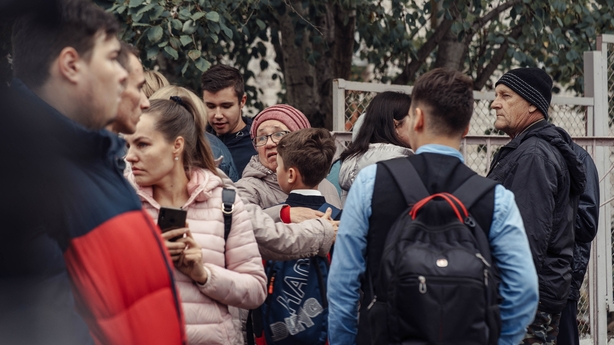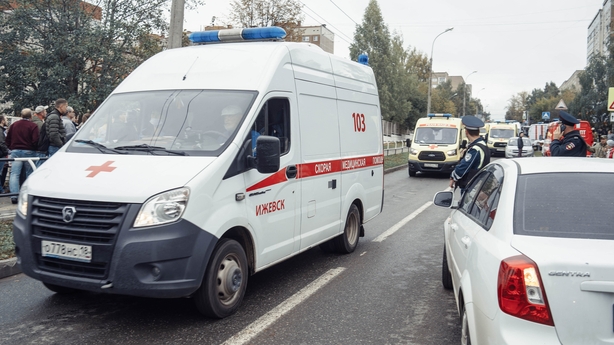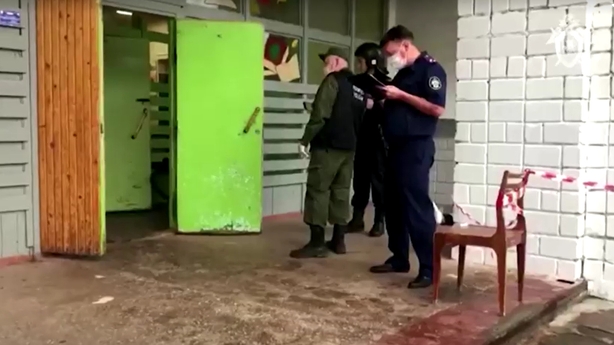A gunman with a swastika on his t-shirt killed 15 people, including 11 children, and wounded 24 at a school in Russia today before dying by suicide, investigators said.
The attacker, a man in his early 30s who was named by authorities as Artem Kazantsev, killed two security guards and then opened fire on students and teachers at School Number 88 in Izhevsk, where he had once been a pupil.
Russia's Investigative Committee, which handles major crimes, said it was looking into the perpetrator's suspected neo-Nazi links.
"Currently investigators...are conducting a search of his residence and studying the personality of the attacker, his views and surrounding milieu," the committee said in a statement.
"Checks are being made into his adherence to neo-fascist views and Nazi ideology."
Investigators released a video showing the man's body lying in a classroom with overturned furniture and papers strewn on the bloodstained floor.
He was dressed all in black, with a red swastika in a circle drawn on his t-shirt.

The Investigative Committee said that of the 24 people wounded, all but two were children.
Regional governor Alexander Brechalov said surgeons had carried out a number of operations.
He said the attacker had been registered with a "psycho-neurological" treatment facility. Investigators said the man was armed with two pistols and a large supply of ammunition.
Mr Brechalov declared a period of mourning in the region to last until Thursday.
Kremlin spokesman Dmitry Peskov said President Vladimir Putin "deeply mourns" the deaths.
He described the incident as "a terrorist act by a person who apparently belongs to a neo-fascist organisation or group".
He said doctors, psychologists and neurosurgeons had been sent on Mr Putin's orders to the location of the shooting in Izhevsk, about 970km east of Moscow.
A city of around 630,000 people, Izhevsk is the regional capital of Russia's Udmurt Republic, located around 1,000km east of Moscow.
The attack was the latest in a series of school shootings that have shaken Russia in recent years and came with the country on edge over efforts to mobilise tens of thousands of men to fight in Ukraine.
Russia's last major school shooting was in April, when an armed man opened fire in a kindergarten in the central Ulyanovsk region, leaving a teacher and two children dead.

Tightening gun laws
Mass shootings at schools and universities in Russia were rare until 2021, when the country was rocked by two separate killing sprees in the central Russian cities of Kazan and Perm that spurred politicians to tighten laws regulating access to guns.
In September 2021, a student dressed in black tactical clothing and helmet armed with a hunting rifle swept through Perm State University buildings killing six people, mostly women, and injuring two dozen others.
The gunman resisted arrest and was shot by law enforcement as he was apprehended and moved to a medical facility for treatment.
It was the second such attack that year, after a 19-year-old former student shot dead nine people at his old school in the Kazan in May.

Investigators said that the gunman suffered from a disorder, but was deemed fit to receive a licence for the semi-automatic shotgun that he used.
On the day of that attack, President Putin called for a review of gun control laws and the age to acquire hunting rifles was increased from 18 to 21 and medical checks were strengthened.
Authorities have blamed foreign influence for previous school shootings, saying young Russians have been exposed online and on television to similar attacks in the United States and elsewhere.
Other high-profile shooting cases have taken place in Russia's army, putting the issue of hazing in the spotlight in the country were military service is compulsory for men aged between 18 and 27.
In November 2020, a 20-year-old soldier killed three fellow servicemen at a military base near the city of Voronezh. In a similar attack in 2019, a young recruit shot dead eight servicemen, saying he faced bullying and harassment in the army.
